

B.F. Skinner Operant Conditioning (Full video) Operant Conditioning. Learning: Negative Reinforcement vs. Punishment. Reinforcement & Punishment. Operant Conditioning: Positive and Negative Reinforcement and Punishment. Positive vs. Negative Reinforcement: A Guide for Parents – Generation Mindful. I almost stopped bringing them to the playground.
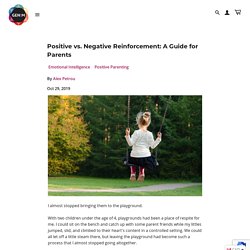
With two children under the age of 4, playgrounds had been a place of respite for me. I could sit on the bench and catch up with some parent friends while my littles jumped, slid, and climbed to their heart's content in a controlled setting. We could all let off a little steam there, but leaving the playground had become such a process that I almost stopped going altogether. Inevitably, when I announced it was time to go, my 3-year-old would run away. Laughing maniacally, he’d climb a slide or shimmy to the top of a play structure and gleefully gaze down at me as though it was a joke, as though dinner didn’t need to be made and naps didn’t need to happen.
Meanwhile my 2-year-old would cry. Executing a graceful playground exit is apparently one of the finer arts of parenting, and clearly one I hadn’t mastered. None of those felt quite right. What Is Negative Reinforcement? What does that mean exactly? Examples of Negative Reinforcement. 12 Examples of Positive Punishment & Negative Reinforcement.
You might be thinking that “positive punishment” sounds like an oxymoron, after all, how can punishment be positive?
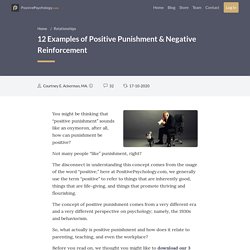
Not many people “like” punishment, right? The disconnect in understanding this concept comes from the usage of the word “positive;” here at PositivePsychology.com, we generally use the term “positive” to refer to things that are inherently good, things that are life-giving, and things that promote thriving and flourishing. The concept of positive punishment comes from a very different era and a very different perspective on psychology; namely, the 1930s and behaviorism. Reinforcement vs Punishment Psychology [Examples] Reinforcement and punishment are often used as parenting tools to modify children’s behavior.
![Reinforcement vs Punishment Psychology [Examples]](http://cdn.pearltrees.com/s/pic/th/reinforcement-punishment-183049524)
Let’s review the difference between positive reinforcement and negative reinforcement, and the difference in outcomes between them. The Difference Between Positive And Negative Reinforcement In behavioral psychology, reinforcement is the introduction of a favorable condition that will make the desired behavior more likely to happen, continue or strengthen in the future1.
Because the favorable condition acts as a reward, reinforcement is a reward-based operant conditioning. Reinforcement vs. Punishment: Changing Behavior. Being a parent has been known as the best thing ever BUT also the most challenging endeavor you will encounter in your lifetime.
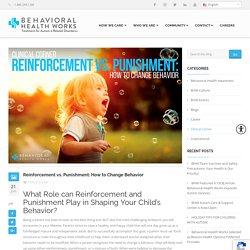
Parents strive to raise a healthy and happy child that will one day grow up as a full-fledged mature and independent adult. But to successfully accomplish this goal, a parent must set forth structure or rules throughout their childhood to help them understand and be realigned when their behavior needs to be modified. When a parent recognizes the need to change a behavior, they will likely end up using either reinforcement, punishment, or a mixture of both. Using Positive Reinforcement to Improve Behavior. When your child misbehaves, rewards might be the last thing on your mind.
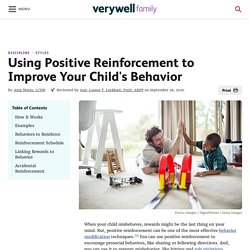
But, positive reinforcement can be one of the most effective behavior modification techniques.1 You can use positive reinforcement to encourage prosocial behaviors, like sharing or following directions. And, you can use it to prevent misbehavior, like hitting and rule violations. Positive reinforcement can also be an effective way to encourage and motivate your child to be responsible, do their chores, get along with their siblings, or complete their homework assignments without arguing. How Positive Reinforcement Works. Positive Punishment: What It Is, Benefits, and Examples. 10 Positive Punishment Techniques & Their Effect. By: Ashley Brown Updated February 11, 2021 Medically Reviewed By: Laura Angers As a parent, it is natural to wonder about the best way to teach your child right from wrong.

Punishing them is no fun, but sometimes it has to be done if you want their behavior to change. The Study of Punishment in Psychology. Punishment is a term used in operant conditioning to refer to any change that occurs after a behavior that reduces the likelihood that that behavior will occur again in the future.

While positive and negative reinforcements are used to increase behaviors, punishment is focused on reducing or eliminating unwanted behaviors. Punishment is often mistakenly confused with negative reinforcement. The difference: Reinforcement increases the chances that a behavior will occur and punishment decreases the chances that a behavior will occur. Types of Punishment Behaviorist B. Discipline for Teens: Strategies and Challenges.
When your child becomes a teenager, your parenting role is likely to shift.
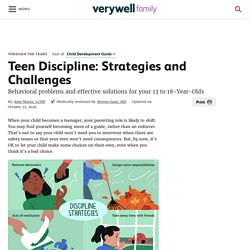
You may find yourself becoming more of a guide, rather than an enforcer. That’s not to say your child won’t need you to intervene when there are safety issues or that your teen won’t need consequences. But, by now, it’s OK to let your child make some choices on their own, even when you think it’s a bad choice. What kind of discipline works for teens? The teen years are notoriously challenging for parents.

Much like the toddler years, kids sometimes seem intent on doing exactly the opposite of what we ask. And for some of the same reasons: Their job now is to find their sea legs as a person, to shape an identity, to sort out what's important to them. Their integrity would be compromised by simply doing what we ask because we ask it. They need to believe it's the right thing for THEM. So discipline as we usually think of it backfires with teens. If you have a strong-willed child, you've already learned from your child's rebelliousness that you can't control your child; you can only help him WANT to cooperate, and foster the emotional control that will help him do so. Of course, if your child hasn't been rebellious, you may have thought you were in control of your child until now. Raisingchildren.net. Praise: what it is and how it works Praise is when you tell your child that you like what they’re doing or how they’re behaving – for example, ‘Great job, Riley’, ‘Well done, Jo’ or ‘That’s awesome, AB’.

Praise nurtures your child’s confidence and sense of self. Disciplining Your Child. Whatever your child's age, it's important to be consistent when it comes to discipline. If parents don't stick to the rules and consequences they set up, their kids aren't likely to either. Here are some ideas about how to vary your approach to discipline to best fit your family. Ages 0 to 2 Babies and toddlers are naturally curious. So it's wise to eliminate temptations and no-nos — items such as TVs and video equipment, stereos, jewelry, and especially cleaning supplies and medicines should be kept well out of reach. When your crawling baby or roving toddler heads toward an unacceptable or dangerous play object, calmly say "No" and either remove your child from the area or distract him or her with an appropriate activity.
Timeouts can be effective discipline for toddlers. What’s the Best Way to Discipline My Child? As a parent, one of your jobs to teach your child to behave. It's a job that takes time and patience. But, it helps to learn the effective and healthy discipline strategies.